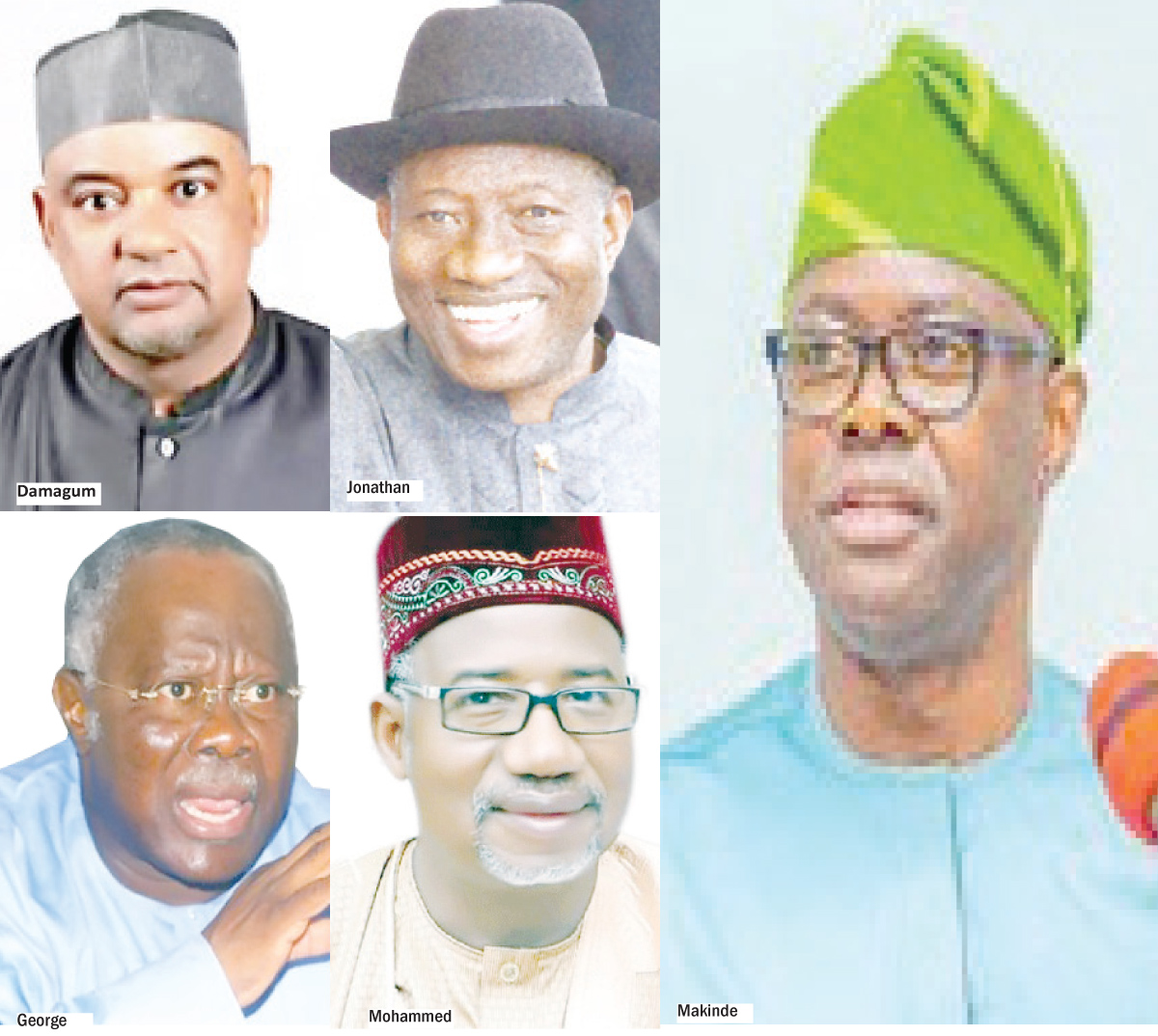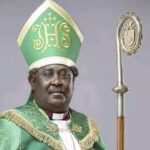The Peoples Democratic Party (PDP) is no stranger to internal rebellion and defections, which have cost it key elections: first in 2015, then again in 2023. In this piece, PHILIP IBITOYE examines the ongoing wave of defections by elected officials from the PDP and what it portends for the party’s 2027 presidential aspiration.
AS Nigeria inches closer to the 2027 general election, the Peoples Democratic Party (PDP) finds itself ensnared in a web of internal disarray and major defections, eerily reminiscent of the circumstances that precipitated its 2015 defeat. In 2015, the party’s fall from grace—after 16 years of uninterrupted national rule—was not simply the result of electoral dynamics. It was the consequence of internal rebellion that culminated in the loss of several members of the party to the opposition. Today, those old ghosts have resurfaced and knocking hard at PDP’s door.
With less than two years to the next presidential contest, the opposition party is grappling with mass defections of elected officials, fracturing alliances, and an identity vacuum that threatens its very relevance as a national contender.
While political fortunes in Nigeria are far from linear—and last-minute revivals are not unheard of—the PDP’s current trajectory points towards deep trouble ahead, according to political observers.
A wave of defections
In recent months, the PDP has been haemorrhaging members at an alarming rate. From the state level to the National Assembly, prominent defections have weakened its structure and stripped it of regional dominance.
In Delta State, a traditional PDP stronghold, the party suffered a shock loss when Governor Sheriff Oborevwori and his predecessor, former vice-presidential candidate Ifeanyi Okowa, crossed over to the APC in April 2025. These moves were seen as the ruling All Progressives Congress (APC) trying to chip away at the advantage the PDP traditionally holds in the South-South region of the country. The APC had lost all states in the region in the 2023 presidential election, but it now controls two states—Delta and Akwa Ibom—due to the defection of their governors and state lawmakers.
In Akwa Ibom, Governor Umo Bassey Eno also shocked many by officially dumping the PDP in June 2025 to align with the APC. His defection was not a lone act; it sparked a mass exodus of political appointees, local government chairpersons, and state lawmakers. Last week, two of the state’s senators—Sampson Ekong (Akwa Ibom South) and Aniekan Bassey (Akwa Ibom North-East)—joined him in the APC.
Osun State, once a key South-West battleground for the PDP, followed a similar script the same week. Senators Francis Fadahunsi (Osun East) and Olubiyi Fadeyi (Osun Central) also defected to the APC, citing “irreconcilable internal crises” and the absence of credible national leadership within the PDP. Similarly, the PDP lost three House of Representatives members from Osun and one from Edo State. Taofeek Ajilesoro (Ife Central/Ife East/Ife North), Emmanuel Olusanya (Atakunmosa West/Atakunmosa East/Ilesha East)—both from Osun—and Marcus Onobun (Esan Central/Esan West/Igueben) from Edo cited the “leadership crisis” in the PDP and the need to align forces with President Bola Tinubu to “deliver the dividends of democracy” to their respective constituents.
This wave of defections from the PDP to the APC has pushed the ruling party to the brink of a two-thirds majority in both chambers of the National Assembly. For example, the APC’s strength in the 109-member Senate has risen to 70—just three seats shy of the 73 required to achieve a two-thirds majority. The PDP now holds only 28 seats, down from the 36 inaugurated on 13 June 2023. In the House of Representatives, the PDP now has only 86 seats, down from at least 102 in June 2023. All of those lost seats have gone to the APC, which now has 224 members in the 360-member green chamber.
Political analysts say these numbers are crucial, as supermajority control may grant the APC extraordinary power to shape the country’s political future through actions such as constitutional amendments without the support of the PDP and other minority lawmakers. Some have expressed concerns that, while favourable for the APC’s political calculations, such dominance is not ideal for the democratic process, as it may erode effective checks and balances.
If these trends continue, the PDP risks being unable to mount a viable presidential challenge in 2027.
Déjà Vu: The ghosts of 2015 and 2023
This isn’t the first time the PDP has walked down this path of internal cannibalism. In the run-up to the 2015 elections, a splinter group of governors—then branded the “New PDP”—rebelled against President Goodluck Jonathan’s leadership. The rebellious PDP governors had hinged their discontent on the party’s handling of zoning, candidate imposition, and lack of internal democracy.
Their departure, coupled with the formation of the APC mega-merger, decimated the PDP’s chances. The loss of these strategic states deprived the PDP of both electoral muscle and political legitimacy in key regions. Jonathan’s defeat at the hands of former President Muhammadu Buhari marked the first time an incumbent president lost an election in Nigeria, an outcome engineered more by robust and well-oiled propaganda orchestration than grassroots disenchantment, and structural dysfunction.
History repeated itself in the build-up to 2023, when five PDP governors—Nyesom Wike (Rivers), Seyi Makinde (Oyo), Samuel Ortom (Benue), Okezie Ikpeazu (Abia), and Ifeanyi Ugwuanyi (Enugu)—rebelled and accused the party leadership of violating the zoning agreement by allowing a northerner, Iyorchia Ayu, to remain as national chairman, despite Atiku Abubakar, the presidential candidate, also being from the North.
The G5 publicly distanced themselves from the party’s presidential campaign in 2023. Though some remained nominally within the PDP, their effective neutrality—or in some cases, tacit support for Tinubu—contributed significantly to the PDP’s defeat. Wike, in particular, has since joined the APC-led government as Minister of the Federal Capital Territory, a move that has further deepened animosity within the party.
PDP losing traditional strongholds
Moreover, the PDP’s historical strength has always been its wide regional base, especially in the South-South, South-East, and North-Central. But recent developments show that the party’s support in these zones is rapidly eroding.
In Akwa Ibom, once a PDP fortress, the party has lost the governor, its two senators, and most of its local government machinery. In Delta, the story is the same. In the South-East, the rise of former Labour Party presidential candidate Peter Obi in the 2023 election displaced the PDP as the dominant opposition force. Despite losing these strongholds, the PDP has so far refused to embrace the idea of merging with other parties.
After losing its 2023 presidential candidate, Atiku Abubakar, to the African Democratic Congress (ADC)—a coalition of top opposition leaders—PDP leaders maintained that they do not need to merge with any party to win in 2027. In an interview with Sunday Tribune, the party’s National Vice Chairman (South-West), Ajisafe Toyese, said those who want a strong opposition should join the PDP, not the other way around.
“It would be very absurd for PDP members—who have a strong party brand, sitting governors and senators—to abandon the PDP and go join a coalition,” he said.
However, political analysts believe it defies logic to expect the PDP to capture the presidency in 2027 with a splintered opposition. Recall that President Tinubu won the 2023 election with less than 37% of the votes, after the opposition parties split more than 60% of the votes between them. There is currently no reason to believe that the opposition would not divide the vote again in 2027 unless they merge to face the APC.
In an interview, Dr Wasiu Olayimika Kewulere of the Department of History and Diplomatic Studies, Kwara State University (KWASU), said a coalition remains the best route to success for the opposition in a Nigerian presidential election.
“It is no accident that the only time a ruling party has been defeated in Nigeria’s political history was when multiple parties merged to take on the incumbent,” Kewulere said.
PDP leaders cling to hope of recovering losses
Nevertheless, PDP leaders are still projecting confidence ahead of the 2027 general election. Following the defection of four more PDP senators and three representatives last week, former Senate President and Chairman of the PDP Board of Trustees (BoT), Adolphus Wabara, said many defectors would return to the party if it delivers strong and inspiring leadership at its upcoming national convention.
Speaking at the PDP’s 101st National Executive Committee (NEC) meeting in Abuja last Thursday, Wabara noted that the party’s ability to resolve its internal differences and elect credible leaders would be key to reclaiming its place as Nigeria’s leading opposition force.
“A successful convention that delivers leadership capable of inspiring confidence will cause many to return. Even those who have never belonged to the PDP will find reasons to join us,” he said.
On his part, the Acting National Chairman of the PDP, Umar Damagum, acknowledged that the party’s problems are self-inflicted. He urged those who had recently left the party to return—or exit quietly without attempting to de-market the PDP.
“But we must also confront the hard truth: much of the injury the PDP has suffered has been self-inflicted. From the Obasanjo era to this moment, we have too often jettisoned ideology in favour of personal ambition,” he said. “This has cost us dearly. Yet, there is still a beauty that exists only in the PDP—our founding vision, our commitment to internal democracy, our enduring mechanisms for dialogue and reconciliation, and our true national outlook.”
However, some political observers believe the party leaders’ comments may have come too late, as the PDP continues to lose members to the APC and appears helpless to stop the bleeding. In an interview with Sunday Tribune, Dr Bola Bakare, a Political Science lecturer at the University of Ilorin (UNILORIN), said the PDP is likely to lose many more elected officials, as many politicians are motivated by power, not ideology.
“If more PDP senators and Reps members see that staying in the PDP will hurt their re-election chances, they will dump the party and defect to the APC, which they might believe gives them a better shot,” he said.
Yet, if the norm-breaking Nigerian politics has taught us anything, it is this: never write anyone off too early. In 2019, many expected Buhari’s popularity to collapse following widespread economic hardship and a spate of terrorist and bandit attacks across the North-East, North-West, and North-Central. In 2023, few predicted the emergence or scale of the Obidient Movement across the South-East, South-West, and North-Central. Political alliances can form overnight. Public sentiment can shift. Scandals, economic hardship, or missteps by the ruling party could open new doors for the opposition.
Nevertheless, with less than two years until the 2027 presidential election, the PDP’s presidential aspiration remains in limbo, hounded by familiar ghosts and old wounds left to fester. Whether it can exorcise them in time remains to be seen.
READ ALSO: Defection: PDP has lost taste — Oghenesivbe
WATCH TOP VIDEOS FROM NIGERIAN TRIBUNE TV
- Let’s Talk About SELF-AWARENESS
- Is Your Confidence Mistaken for Pride? Let’s talk about it
- Is Etiquette About Perfection…Or Just Not Being Rude?
- Top Psychologist Reveal 3 Signs You’re Struggling With Imposter Syndrome
- Do You Pick Up Work-Related Calls at Midnight or Never? Let’s Talk About Boundaries








